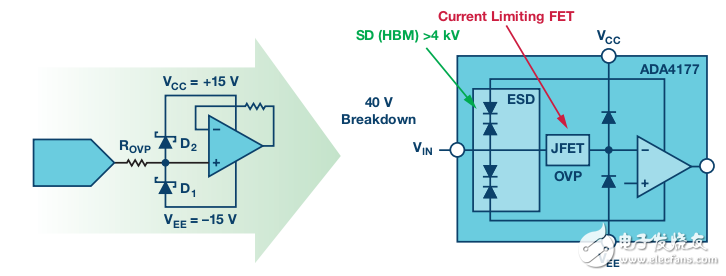
资料下载

ADA4177系列在精密耐用型运算放大器应用中的优势
The ADA4177 family is composed of low noise, low bias current op amps with overvoltage and
electromagnetic interference (EMI) protection. With single, dual, and quad versions, they all offer
±32 V input over voltage protection (OVP) on-chip, leading to a reduced bill of materials cost and
board space by eliminating the need for external OVP discretes.
With the dual advantage of simplifying system design and making the end system easier to pass EMI
susceptibility testing by including integrated EMI filtering on inputs, the parts meet an impressive
70 dB of rejection at 1000 MHz.
For precision instrumentation, end systems can be made smaller due to the integrated OVP and
EMI. There is no need to calibrate the system over time or temperature change leading to increased
uptime and reduced cost of ownership. This is due to the ultralow offset voltage and drift specifications.
For the ultimate end system precision and linearity, features such as the rail-to-rail output
adds value for designers that need additional dynamic range to measure the smallest level signals.
Low noise performance complemented by excellent dc precision and ac accuracy specifications
minimize the need for design trade-offs, especially for small form factor end systems where low
power dissipation is needed.
For process control sensor interfaces such as thermocouples, RTDs, and strain gages, the sensor may be off board exposing the op amp inputs to
overvoltage and EMI. Therefore, the on-chip robust protection is a key advantage in space constrained modules. The ADA4177 family robust inputs
combined with low supply current and consistent specification over a wide range allows them to be used as input module front-end amplifiers with
signal swings compatible to industry standards, and especially for small form factor, USB-powered applications where low power and small
packages are critical.
The drive for increased productivity within all industrial environments is driving PCL and DCS systems to incorporate more and more channels to
facilitate more process node monitoring. The multichannel versions lead to greater efficiencies within the end system, which ultimately lower the
cost of the system and simplify design.

声明:本文内容及配图由入驻作者撰写或者入驻合作网站授权转载。文章观点仅代表作者本人,不代表电子发烧友网立场。文章及其配图仅供工程师学习之用,如有内容侵权或者其他违规问题,请联系本站处理。 举报投诉
- 相关下载
- 相关文章





